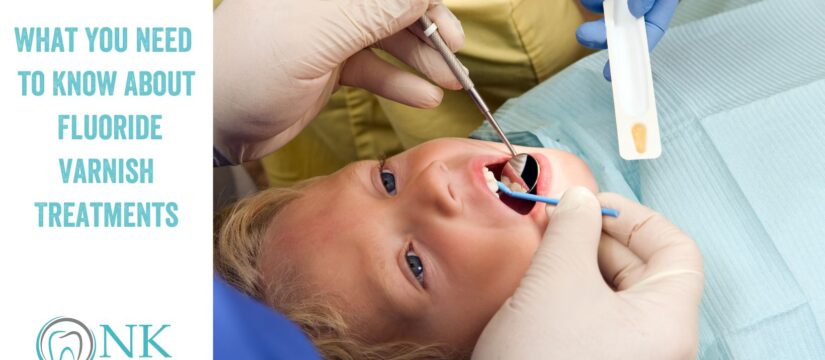
Fluoride is an essential mineral in the battle against tooth decay. In its natural form, fluoride is found throughout the earth’s crust, and released from rocks into the soil, water and air. Fortunately, its ability to be synthesized in a laboratory allows fluoride to be used as an important ingredient in most toothpastes and some mouthwashes.
In the 1930s, researchers found that people who grew up drinking naturally fluoridated water had up to two-thirds fewer cavities than people living in areas without it. Soon after, communities and cities throughout the United States — including Chicago — added fluoride to their municipal water supply. Our blog post — Fluoride: Myths and Facts — provides more information on this topic.
While you may be familiar with getting fluoride in these ways, fluoride varnish treatments typically aren’t well-publicized. This treatment applied by your dentist can be an effective line of defense for children and adults who are susceptible to cavities for a variety of reasons.
What is Fluoride Varnish?
A fluoride varnish is a concentrated form of fluoride, painted onto the top and sides of the teeth. The varnish itself is not a permanent layer — it stays on the teeth for several hours, allowing the fluoride to seep into the enamel and strengthen the teeth.
According to Colgate, “With dental-office fluoride treatments, your dentist or hygienist dries off your mouth and applies a paint, foam or varnish. Some dentists put a gel or foam into a mouthguard that you wear for a few minutes. You’re asked not to eat or drink anything and to avoid smoking for 30 minutes afterward. At-home fluoride treatments for adults, mostly gels, are also available by prescription, based on your particular needs, your risk of dental decay and the level of fluoride in your local water supply.”
How Fluoride Varnish Treatments Can Protect Teeth
As WebMD explains the process, minerals are added to and lost from a tooth’s enamel layer through two processes: demineralization and remineralization. Minerals are lost (demineralization) from a tooth’s enamel layer when acids — formed from plaque bacteria and sugars in the mouth — attack the enamel. Minerals such as fluoride, calcium and phosphate are redeposited (remineralization) to the enamel layer from the foods and waters consumed. Too much demineralization without enough remineralization to repair the enamel layer leads to tooth decay.
Fluoride varnish treatments help to prevent tooth decay by making the tooth more resistant to acid attacks from plaque bacteria and sugars in the mouth. It also can reverse early decay. In children under six years of age, fluoride is incorporated into the development of permanent teeth, making it difficult for acids to demineralize the teeth. Fluoride varnish treatments work to speed remineralization as well as disrupt acid production in already erupted teeth of both children and adults. According to Hinsdale Dental, such treatments can prevent tooth decay and reverse early signs of enamel damage, such as pitting and shallow caries (cavities). When used in small amounts, fluoride supplements show a 24 percent prevention of caries lesions in permanent teeth.
Who Can Benefit from Fluoride Varnish Treatments?
Fluoride varnish applications are aimed especially at children with a high risk of tooth decay. It’s not considered a primary form of treatment, but rather a complement to other fluoride treatments such as toothpaste or fluoridated water. However, adults can greatly benefit as well. Colgate provides the following list of the types of people who should ask their dentist about fluoride varnish treatments:
If you are taking medications that cause dry mouth or have a disease that causes dry mouth — Without saliva to neutralize the acids in your mouth and wash away food particles, you’re more susceptible to tooth decay.
If your gums have receded or pulled away from the teeth — This gives bacteria more room to roam and hastens tooth decay.
If you wear braces — Braces and other orthodontic appliances trap a high amount of bacteria that can lead to cavities.
If you’ve had radiation therapy to the neck or head — Radiation damages the salivary glands, causing dry mouth.
Moreover, people who drink only spring water — which is not fluoridated —should consider fluoride varnish treatments. They have also been shown to be effective in reducing the incidence of cavities among people ages 55 and over. Age is a factor, as even for those without any known medical problems, natural wear and attrition can cause gums to recede and teeth to become more vulnerable to decay
Ask Your Dentist — Your Trusted Partner in Oral Health
Fluoride varnish treatments can be an important supplemental defense against tooth decay. Scheduling regular examinations with your dentist is essential to not only early diagnosis and treatment of cavities, periodontal (gum) disease and other conditions, but for recommendations on improving and maintaining your oral health.
At NK Family Dental, it is our mission to provide the highest quality and most compassionate oral care to our Chicago patients, including both dental and periodontal services. Our practice is trusted for advanced oral surgery procedures and comfortable root canal treatment.
Our dental specialists include our general dentist, Dr. Nilofer Khan, our endodontist, Dr. Sabek, and our periodontist, Dr. Amir Danesh. Dr. Danesh is a board-certified periodontist and Diplomat of the American Board of Periodontology. He has contributed to the publication of two books, as well as published over 20 papers in prestigious dental research journals.
We understand that the main concern you may have is cost, which is why we accept all major PPO plans for dental insurance and also offer our in-house dental plan. Please see our financing page for more information.
We serve the neighborhoods of Logan Square, Bucktown, Humboldt Park, and Wicker Park with the dedication that’s earned us the reputation as the Best Dentist in Chicago!
Schedule your visit through ZocDoc, or contact us directly. We look forward to treating you soon!
